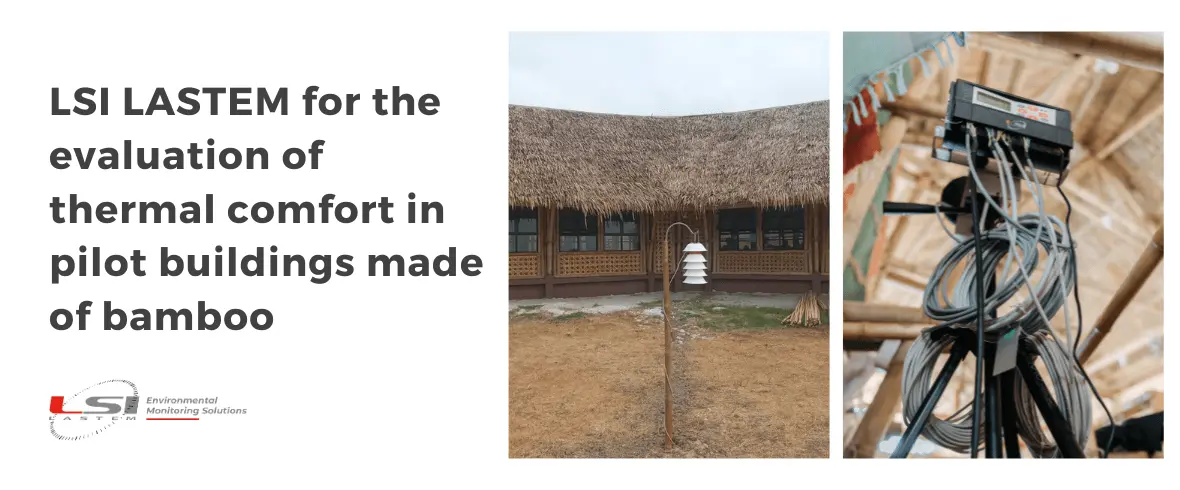LSI LASTEM for the evaluation of thermal comfort in pilot buildings made of bamboo

Sustainability as a keyword
In recent years, there has been a growing interest in sustainable building materials, which can be integrated into the environment and improve energy efficiency and living comfort. Recently, an interesting project has been launched in the Philippines, with the aim, among others, of evaluating the thermal comfort of pilot buildings made of bamboo. The latter, in fact, is not only an ecological material, cheap, but it is also very versatile and resistant.
Thermal comfort in first place
The thermal comfort of bamboo building is the most important element of the project, as the tropical climate, where they are built, is particularly hot and humid and can have an important influence on the quality of life of the occupants. The research project aims to evaluate various parameters to guarantee “natural” thermal comfort, without the aid of artificial air conditioning systems inside the building, in this case a weaving center. Environmental parameters that affect the thermal sensation of the individuals are:
- Average radiant temperature;
- Air temperature;
- Air relative humidity;
- Air velocity.
The project plans to monitor and evaluate these parameters on a regular basis to evaluate the thermal comfort obtained with respect to the architectural and physical characteristics of the building envelope.
An international project
The structure of the pilot building is built using the innovative Composite Bamboo Shear Wall Technology from Base-Bahay, a non-profit social housing organization in the Philippines. With this technology, over 1.200 houses have already been built across the country, to be resistant to fires, earthquakes and typhoons. The buildings are designed with the aim of obtaining a smart bioclimatic design and the best thermal comfort/cost ratio. The project aims to provide better thermal comfort, while ensuring that the construction materials and technologies used are sustainable, also in terms of costs, and adapted to the characteristics of the climate even in the long term.
The interesting potential of bamboo constructions led David Ayala Laverde, a student at Chalmers University of Technology (Sweden), to collaborate with Base-Bahay, to study the thermal performance of the building envelope, the thermal comfort obtained and the climatic adaptation of the pilot buildings. In particular, the study involves the analysis of the life cycle impacts of Composite bamboo Shear Wall Technology and its strength potential in the hot and humid climate of the Philippines, helping to identify possible improvements in order to greater natural ventilation and thermal insulation of the structure compared to incident radiation and external heat.
The Adaptive Thermal Comfort model was used for the project, which is based on the assumption that those who occupy a non-air-conditioned environment tend to adapt better if they can operate freely on the control of the microclimate according to their habits. The research project aims to evaluate the thermal comfort of the occupants, as a function of the characteristics of the building envelope, and to provide guidelines on how to achieve improvements at low cost.
Collaborating on the project, LSI LASTEM provided the measuring equipment for the evaluation of long-term thermal comfort. For this purpose, an E-Log data logger mounted on a tripod connected to:
- an internal temperature and relative humidity sensor;
- a black globe temperature sensor;
- a hot wire anemometer;
- two contact temperature sensors for surface temperature measurement
- an outdoor air temperature sensor protected by an anti-radiant shield.
The data logger acquires the values, processes them on predefined statistical time bases and saves them in its memory. A local computer, through the 3DOM software, downloads the data and makes it possible to analyze and reprocess them.
Sustainable architecture? A future to hope for
The technology used for sustainable bamboo building design is well developed, in fact Composite Bamboo Shear Walls are in Colombia’s building codes since 2002; and since 2021 it is standardized in ISO 22156:2021. Instead, the project on the evaluation of thermal comfort of these pilot buildings is still in its initial phase but it is already promising and could bring numerous benefits both for the environment and for the local communities. The research on the performance of the building envelope and the thermal comfort of this pilot building will serve to demonstrate the feasibility and benefits of a sustainable architecture with low environmental impact. The results of the research could inspire other similar projects to promote the use of bamboo as a sustainable building material, with important benefits for the thermal comfort of the occupants.
